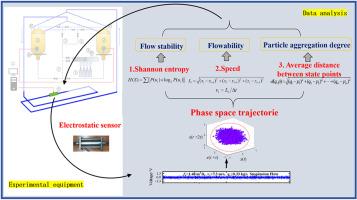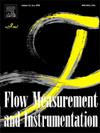Transportation characteristics analysis of the dense-phase gas-solid two-phase flow based on phase space reconstruction
IF 2.3
3区 工程技术
Q2 ENGINEERING, MECHANICAL
引用次数: 0
Abstract
The operational efficiency and safety of the dense phase pneumatic conveying system is deeply influenced by the transportation characteristics of the dense-phase gas-solid two-phase flow in conveying pipelines. This paper presents a framework for analyzing the transport characteristics of the gas-solid two-phase flow based on the phase space reconstruction. The framework explores the transport characteristics by reconstructing the state evolution trajectories of the two-phase flow system in state space. The main goal is to enhance the interpretability of feature analysis. By employing the phase space reconstruction method to process the output signals of an electrostatic sensor, the evolution trajectory of the dynamic state of the gas-solid two-phase flow system was reconstructed in phase space.This provides an effective entry point for extracting the essential dynamic characteristics of the gas-solid two-phase flow system. Furthermore, a series of feature values were proposed, including the average speed of the trajectory, Shannon entropy of the trajectory, and the average distance between state points in phase space, which were used to respectively evaluate important transportation characteristics such as flowability, stability, and particle aggregation degree of the gas-solid two-phase flow. Moreover, through comparative analysis with visualization images that represent actual conveying conditions, the effectiveness of these proposed feature values in evaluating these transportation characteristics was verified.

基于相空间重构的密相气固两相流输运特性分析
密相气固两相流在输送管道中的输送特性深刻影响着密相气力输送系统的运行效率和安全性。本文提出了一种基于相空间重构的气固两相流输运特性分析框架。该框架通过重构两相流系统在状态空间中的状态演化轨迹来探索输运特性。主要目标是增强特征分析的可解释性。采用相空间重构方法对静电传感器输出信号进行处理,在相空间中重构了气固两相流系统的动态演化轨迹。这为提取气固两相流系统的基本动态特性提供了一个有效的切入点。在此基础上,提出了轨迹平均速度、轨迹香农熵和相空间状态点平均距离等一系列特征值,分别用于评价气固两相流的流动性、稳定性和颗粒聚集度等重要输运特征。此外,通过与代表实际输送条件的可视化图像的对比分析,验证了所提出的特征值在评价输送特性方面的有效性。
本文章由计算机程序翻译,如有差异,请以英文原文为准。
求助全文
约1分钟内获得全文
求助全文
来源期刊

Flow Measurement and Instrumentation
工程技术-工程:机械
CiteScore
4.30
自引率
13.60%
发文量
123
审稿时长
6 months
期刊介绍:
Flow Measurement and Instrumentation is dedicated to disseminating the latest research results on all aspects of flow measurement, in both closed conduits and open channels. The design of flow measurement systems involves a wide variety of multidisciplinary activities including modelling the flow sensor, the fluid flow and the sensor/fluid interactions through the use of computation techniques; the development of advanced transducer systems and their associated signal processing and the laboratory and field assessment of the overall system under ideal and disturbed conditions.
FMI is the essential forum for critical information exchange, and contributions are particularly encouraged in the following areas of interest:
Modelling: the application of mathematical and computational modelling to the interaction of fluid dynamics with flowmeters, including flowmeter behaviour, improved flowmeter design and installation problems. Application of CAD/CAE techniques to flowmeter modelling are eligible.
Design and development: the detailed design of the flowmeter head and/or signal processing aspects of novel flowmeters. Emphasis is given to papers identifying new sensor configurations, multisensor flow measurement systems, non-intrusive flow metering techniques and the application of microelectronic techniques in smart or intelligent systems.
Calibration techniques: including descriptions of new or existing calibration facilities and techniques, calibration data from different flowmeter types, and calibration intercomparison data from different laboratories.
Installation effect data: dealing with the effects of non-ideal flow conditions on flowmeters. Papers combining a theoretical understanding of flowmeter behaviour with experimental work are particularly welcome.
 求助内容:
求助内容: 应助结果提醒方式:
应助结果提醒方式:


